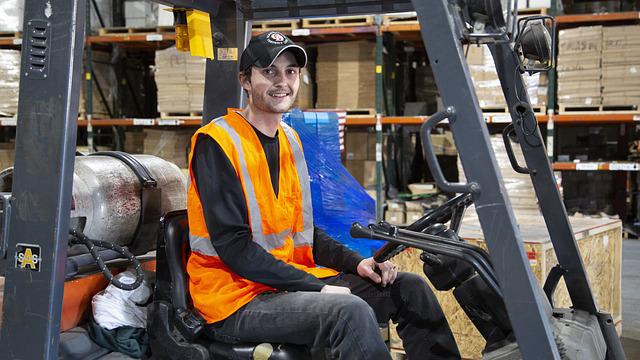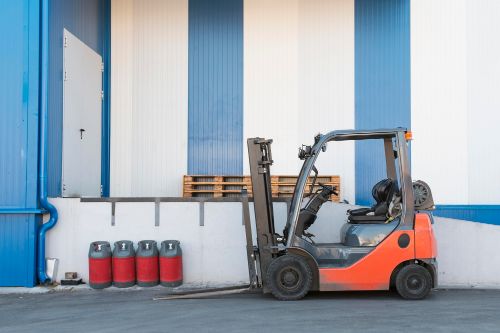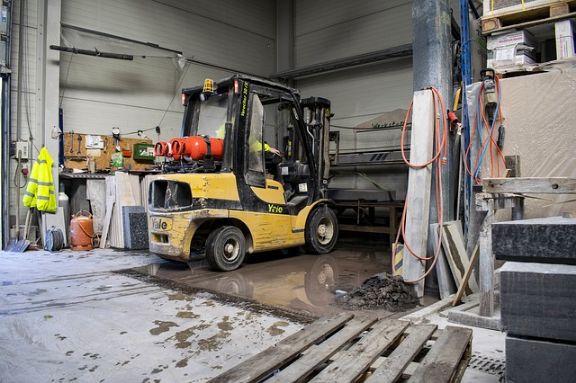
When it comes to grilling, propane is a popular choice for fuel because it is convenient, easy to use, and provides a consistent heat source. However, not all propane tanks are created equal, and using the wrong type of tank can be dangerous. In particular, many people wonder if a forklift propane tank will work on a grill. The short answer is no, a forklift propane tank is not designed to work with a grill and should not be used for this purpose.
A forklift propane tank is designed to power industrial equipment such as forklifts, generators, and heating systems. These tanks are large, heavy, and have a different type of fitting than a standard barbecue grill. They also have a much higher pressure than a grill tank, which is not safe for use with a grill.
A standard barbecue grill, on the other hand, requires a smaller, portable propane tank with a standard barbecue valve. These tanks are typically 20 pounds or less and are designed for use with grills, portable heaters, and other outdoor cooking equipment. They have a lower pressure and a different type of fitting than a forklift propane tank.
Using a forklift propane tank on a grill can be dangerous. The high pressure in the tank can cause the grill to malfunction, leading to a fire or explosion. Additionally, the fittings on the tank are not compatible with a grill, which can cause leaks or other issues.
While propane is a convenient and popular choice for grilling, it’s important to use the right type of tank. A forklift propane tank is not designed to work with a grill and should not be used for this purpose. It is recommended to use a standard barbecue grill propane tank for safe and efficient grilling. It’s always better to be safe than sorry, so always make sure to use the right equipment and follow safety guidelines when using propane tanks.
The Key Difference of the Two
You are correct. Forklift propane tanks are designed for liquid withdrawal, while standard grill tanks are designed for vapor withdrawal.
Forklift propane tanks are designed to hold large amounts of liquid propane and are equipped with a liquid withdrawal valve that is used to withdraw the propane in liquid form. This allows the forklift to run on propane in liquid form, which allows the engine to run more efficiently and with more power.
Standard grill tanks, on the other hand, are designed to hold smaller amounts of propane and are equipped with a vapor withdrawal valve. This allows the propane to be withdrawn in gaseous form, which is the form in which it is used to fuel grills and other outdoor cooking equipment.
The difference in the withdrawal method between forklift tanks and standard grill tanks is due to the different pressure requirements of the two types of equipment. Forklifts and other industrial equipment require a higher pressure to operate effectively, while grills and other outdoor cooking equipment require a lower pressure.
Because of these differences, it’s not recommended to use a forklift propane tank on a barbecue grill. The fittings, pressure and withdrawal method are not compatible and trying to use a forklift tank with a grill could be dangerous. It is always best to use the right equipment and follow safety guidelines when using propane tanks.
| Background Information | |
|---|---|
| Forklift Propane Tank | Standard Grill Propane Tank |
|
Size: Typically larger, often 33 pounds (about 8 gallons of liquid propane) Capacity: Holds around 7-8 gallons of liquid propane at 80% fill Design Features:
|
Size: 20-pound tank, about 18 inches high and 12 inches in diameter Capacity: Holds up to 4.7 gallons of liquid propane at 80% fill Design Features:
|
Physical Compatibility
Connectors and Valves on Both Types of Tanks
Forklift Propane Tank:
- Forklift propane tanks usually come equipped with a liquid service valve, a relief valve, a liquid level gauge, and a fill valve.
- The connectors often cater to liquid propane withdrawal, making them fundamentally different from the standard grill tank connectors.
- These connectors can be either threaded (POL connectors) or a quick-connect type, designed for rapid attachment and detachment.
Standard Grill Propane Tank:
- The grill propane tanks usually have an Overfill Protection Device (OPD) valve, which is identifiable by its triangular-shaped handwheel.
- Grill tanks are fitted with Type 1 (QCC1) connectors, which are meant for vapor withdrawal and have safety features to prevent accidental gas release.
Potential Differences and Challenges
- Orientation: Forklift tanks are horizontal, which might not be suitable for grills designed to connect to vertical tanks.
- Withdrawal Type: Forklift tanks are for liquid withdrawal, whereas grill tanks are for vapor withdrawal. Connecting a grill to a forklift tank without the necessary adjustments might result in liquid propane entering the grill, leading to dangerous flare-ups or damaging the grill.
- Connection Type: The difference in connectors (POL vs. QCC1) can pose challenges in directly connecting the tanks to appliances not designed for them.
Adapters and Conversion Kits Available
- POL to QCC1 Adapters: These are available for converting older POL connections to the newer QCC1 standard. This is especially handy for those with older grill equipment.
- Horizontal to Vertical Tank Adapters: Some adapters can facilitate the use of horizontal tanks in applications that generally use vertical tanks.
- Liquid to Vapor Withdrawal Converters: It’s essential to ensure that only vapor reaches grilling equipment. Certain kits can help convert liquid propane withdrawal systems to vapor withdrawal, ensuring safety.
- Quick-Connect Adapters: These can be used to convert traditional threaded connections to quick-connect systems, allowing for easy attachment and detachment.
When considering any adapter or conversion kit, it’s crucial to prioritize safety. Always ensure that any changes made to the propane system are compatible and safe for the intended use. It’s advisable to consult with a propane expert or technician before making modifications.
Capacity Differences
Comparison of Tank Sizes and Propane Volumes
Forklift Propane Tank:
- Size: Typically, forklift propane tanks are designed to be larger, with common sizes being around 33 pounds.
- Propane Volume: This equates to approximately 7-8 gallons of liquid propane when filled up to the recommended 80% capacity.
Standard Grill Propane Tank:
- Size: The standard grill propane tank, often referred to as a BBQ tank, has a capacity of 20 pounds.
- Propane Volume: This means it can hold up to 4.7 gallons of liquid propane when filled to 80%.
Estimation of Grill Usage Time Based on Forklift Tank Size
- An average grill uses approximately half a gallon to one gallon of propane per hour, depending on its size and the number of burners.
- Given this, a 20-pound standard grill tank would last approximately 9-18 hours of continuous grilling.
- In comparison, using a 33-pound forklift propane tank filled to its capacity, one could expect between 14-28 hours of continuous grilling.
Pros and Cons of Using a Larger Tank
Pros:
- Longer Grilling Sessions: With a larger tank, there’s less need to refill or replace the tank frequently, allowing for extended grill sessions.
- Economical: It can be more cost-effective in the long run to refill a larger tank than frequently exchanging smaller tanks.
Convenience: Reduces the frequency of trips to the propane supplier or exchange stations.
Cons:
- Portability Issues: Larger tanks are heavier and more cumbersome to move around.
- Safety Concerns: If not connected correctly, the increased volume and potential liquid withdrawal can pose risks.
- Space Consumption: They take up more space, which may not be ideal for compact patios or balconies.
- Overkill for Casual Grillers: If someone grills infrequently, having such a large propane supply might be unnecessary.
It’s essential to weigh the pros and cons based on individual needs and usage patterns. Safety should always be the top priority when considering tank capacities and connections.
Practical Considerations
Cost Implications
Refilling Costs, Potential Savings, or Overspending:
- Refilling Costs: Generally, propane is priced by the gallon. A larger tank, like the forklift propane tank, will cost more to fill completely, but the price per gallon can sometimes be cheaper in bulk.
- Potential Savings: Over time, users might find savings in refilling larger tanks less frequently, especially if they grill often. – Additionally, some suppliers may offer volume discounts for larger tanks.
- Overspending: However, for casual grillers who don’t grill frequently, investing in a larger tank might result in unnecessary costs, especially if the propane sits unused for prolonged periods.
Equipment Costs (e.g., Adapters):
- Adapters and conversion kits that allow forklift tanks to be used safely with grills will incur additional costs. Prices vary, but high-quality adapters are crucial for safety and can be more expensive.
Portability and Convenience
- Forklift propane tanks are larger and heavier, making them less portable. For those who frequently move their grills or like to take them on road trips or camping, the standard grill tank is more practical.
- A forklift tank might be better suited for permanent or semi-permanent grill setups, like an outdoor kitchen, where mobility isn’t a concern.
Space and Aesthetics Considerations for Backyard Settings
- Space: Forklift tanks, being bulkier, will take up more space. This might be a concern for compact patios, balconies, or grilling areas with limited storage.
- Aesthetics: The larger, industrial look of the forklift tank may not align with everyone’s aesthetic preferences for backyard settings. Standard grill propane tanks, on the other hand, are often designed with residential users in mind and might be more visually appealing or easier to conceal.
Can You Convert a Forklift Propane Tank For Use With a Barbecue?
It is not recommended to convert a forklift propane tank for use with a barbecue grill.
a forklift propane tank is not designed for use with a barbecue grill. The design and pressure of a forklift propane tank are not compatible with a grill, and using one could be dangerous. The arrow on the tank case indicates the correct orientation for the tank, and a forklift propane tank must be mounted in a specific way to be used with forklifts and other industrial equipment. Additionally, the fittings on a forklift propane tank are not compatible with a grill and trying to convert it would be illegal and dangerous. It is always important to use the right equipment and follow safety guidelines when using propane tanks.
it is illegal to convert a forklift propane tank for use with a barbecue grill as it is against safety regulations. The conversion process itself is also difficult and requires specialized knowledge and equipment.
It’s always better to be safe than sorry, so always make sure to use the right equipment and follow safety guidelines when using propane tanks. It is not recommended to convert a forklift propane tank for use with a barbecue grill, and it is not legal either.
Even You Have Shutoff Valve and Adapter, Conversion Should Not be Done
Can you hook a forklift propane tank on a grill? Many have done so, but it is dangerous and should not be done under any circumstances.
A forklift propane tank does have its own shutoff solenoid valve and it would require an adapter to fit it to the hose of a barbecue grill. However, even with an adapter, it is not recommended to use a forklift propane tank on a barbecue grill. The pressure and design of the tank are not compatible with a grill, and using one could be dangerous.
While the hose of a barbecue grill has an overpressure relief valve, it is not designed to handle the high pressure of a forklift propane tank. This could cause the valve to malfunction, leading to a fire or explosion. Additionally, the fittings on a forklift propane tank are not compatible with a grill, which could cause leaks or other issues.
It’s always better to be safe than sorry, so always make sure to use the right equipment and follow safety guidelines when using propane tanks. In this case, it is not recommended to use a forklift propane tank on a barbecue grill, even with an adapter. It is better to use a standard barbecue grill propane tank for safe and efficient grilling.
Is BBQ Propane and Forklift Propane the Same?
BBQ and grill propane and forklift propane are both propane, but they are stored and used differently.
BBQ propane is stored in smaller, portable tanks that are designed to be used with outdoor cooking equipment such as grills, portable heaters, and camping stoves. These tanks typically hold 20 pounds or less of propane and are equipped with a standard barbecue valve. They are designed to work at a lower pressure, and the fittings are compatible with the hoses and regulators of most outdoor cooking equipment.
Forklift propane, on the other hand, is stored in larger tanks that are designed to power industrial equipment such as forklifts, generators, and heating systems. These tanks can hold hundreds of pounds of propane and are equipped with fittings that are designed to work with the specific equipment they are used with. They are designed to work at a higher pressure and are not compatible with the fittings of BBQ propane tanks.
While both types of propane are the same chemical compound, they are stored and used differently and are not interchangeable. It is important to use the correct type of propane for the equipment you are using, and it is not recommended to use forklift propane on a barbecue grill.
To Make a Conclusion
while a forklift propane tank and a standard grill propane tank both contain propane, they are designed and used differently. Forklift propane tanks are designed for liquid withdrawal, while standard grill tanks are designed for vapor withdrawal. The pressure requirements, fittings and withdrawal method are not compatible between the two types of tanks.
Using a forklift propane tank on a barbecue grill could be dangerous and could lead to a fire or explosion. It is always best to use the right equipment and follow safety guidelines when using propane tanks. Therefore, it is not recommended to use a forklift propane tank on a barbecue grill. It is better to use a standard barbecue grill propane tank for safe and efficient grilling.

Mike is an experienced propane technician with over 15 years of professional experience in the field. He has dedicated his career to helping customers with their propane needs, from installation to maintenance and repair. Together with Jeremy, he co-founded this website to provide useful information and guidance to customers seeking reliable propane services.







